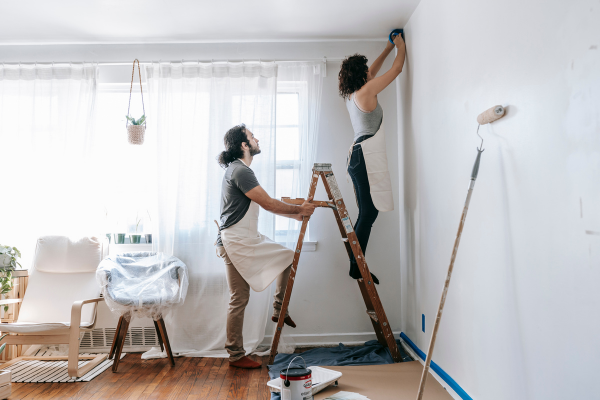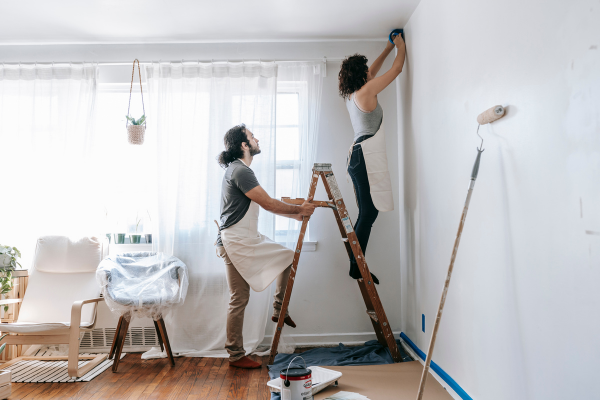If you have money to invest into property, you might be thinking about buying something run-down that you can renovate. And if it’s purely a financial investment, you may be able to buy something relatively cheaply and end up with a property that’s gained in value by significantly more than it cost you to do the work.
However, if you are renovating a home for yourself, the big benefit is you can customise it to your own needs and preferences, without having the additional time and cost of self-building from scratch.
Those are ideal outcomes though, and there are certainly no guarantees when it comes to costs and property values. So here is an overview of some of the main pros and cons of buying a ‘project’ and key things you should consider before moving ahead.


Pros…
Sense of achievement!
On a personal level, it can give you a great sense of satisfaction and achievement to turn a run-down property into a lovely home, whether that’s for yourself, a tenant or a new home owner.
Create a property that works for you
You can create the property you want by making changes to the layout and facilities so that it works best for you. Bear in mind you may need planning permission and will need to also check building regulations requirements with the local authority before beginning work.
If you’re a HMO landlord, it can be particularly helpful if you can buy something that already needs a fair amount of renovation. That’s because, in many cases, investors have to make alterations to satisfy both legal requirements and tenant preferences – such as ensuring minimum room sizes, creating extra bedrooms and adding bathrooms. Buying a property that’s not in good condition can mean you’re not spending more on the purchase than necessary.
Boost your equity
Provided you carry out thorough property market research and budget carefully before you buy, it’s possible to make a good equity gain. If the property needs a lot of work, especially if it needs so much work it can only be bought with cash, it could go up in value by more than you spent on renovations, and that may give you options such as:
- Remortgage and release some, if not all of your capital, to either spend and enjoy or reinvest
- Remortgage onto a better interest rate because of the lower loan to value
- Simply enjoy the peace of mind of knowing you have a good equity ‘cushion’ to protect you in case of market falls


Cons…
Scarcity
‘Projects’ aren’t as easy to come by or as much of a bargain as they used to be. The popularity of home renovation shows and a rapidly rising market through the late ‘90s and early to mid-2000s resulted in a huge wave of renovations. That means there simply aren’t the number of run-down properties that there used to be.
So, if you’re set on buying a renovation project, it can take time to find the right thing and there may be competition from other buyers that forces up the price.
It may not be as profitable as you hope
Not every type of renovation is a money maker. If you’re simply replacing the kitchen and bathrooms and redecorating, the property may only increase in capital value by what the work cost you.
The most profitable projects tend to be where the most work is required, which will mean a bigger capital outlay and more time to complete the renovation. So, if it’s an investment, you need to budget not only for the work itself, but also for the cost of holding the property until it’s ready to sell or let, which can add £1,000s to your budget.
And if it’s going to be your own home, there’s the ongoing cost of your accommodation until the property is ready to move into – bearing in mind that these projects usually take longer to complete than initially expected.
Risk
The financial risk is greater with a renovation project than if you’re buying a ready-to-go property. Because of the scarcity of good investment opportunities in this market versus demand, you need to be careful that you don’t pay more for the property than it will be worth once it’s been done up.
Additional risk factors include:
- The market could fall after you buy, meaning the end value will be lower than anticipated
- The cost of materials and labour could increase over the course of a longer project – as happened during the pandemic
- Costly problems might surface once work begins, e.g. you could discover serious damp or a timber infestation, or even subsidence – which is why it’s so important to have a full building survey before you buy
If it’s your own dream home that you’re planning to live in for the foreseeable future, that may not be such a big concern, but property investors could find their profits dramatically reduced or even wiped out.
If you are looking for a renovation project in the area, do get in touch with your local branch and we’ll be very happy to help in your search.









